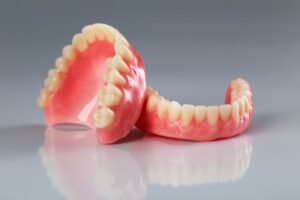5 Ways Dentures Affect Your Nutrition
August 2, 2025

Dentures are a reliable solution for people who have lost most or all of their natural teeth, helping restore confidence and allowing them to smile again. However, while dentures improve appearance and basic oral function, they can also have an impact on nutrition. Since eating is one of the primary roles of teeth, switching to dentures may require adjustments in diet and eating habits. Here are 5 ways dentures can affect nutrition and how you can maintain a balanced, healthy diet.
1. Limited Chewing Efficiency
Natural teeth are firmly anchored in the jawbone, allowing for powerful and efficient chewing. Dentures, on the other hand, rest on the gums and can shift slightly during eating. This can make chewing certain foods — like raw vegetables, crunchy fruits, or chewy meats — more challenging. As a result, some denture wearers avoid these foods altogether, which can reduce their intake of important vitamins, fiber, and protein. Cutting foods into smaller pieces or cooking vegetables until they’re softer can make them easier to chew.
2. Reduced Bite Force
Dentures typically provide only a fraction of the bite force of natural teeth. This can make it difficult to eat tough or dense foods such as nuts, crusty bread, or steak. People may gravitate toward softer, more processed foods that are easier to chew but often higher in refined carbs and lower in nutrients. This shift can negatively affect overall health if not balanced with other nutrient-rich options.
3. Changes in Taste and Appetite
Dentures cover part of the palate, which can interfere with taste sensations and even reduce the enjoyment of eating. In addition, if dentures don’t fit properly, they may cause sore spots or discomfort that lead to a decreased appetite. Regular denture adjustments and relines are important to maintain comfort and prevent these issues from interfering with proper nutrition.
4. Risk of Nutrient Deficiencies
Because of the challenges of chewing and biting, some denture wearers unintentionally limit their diets, avoiding foods like lean meats, raw vegetables, and whole fruits. Over time, this can lead to nutrient deficiencies — such as insufficient protein, calcium, or vitamin C — which are crucial for maintaining muscle strength, bone health, and a robust immune system. A nutritionist or dentist can help recommend alternative sources of these nutrients that are denture-friendly.
5. Slower Eating and Smaller Portions
Adjusting to dentures often means learning to chew more slowly and carefully to avoid dislodging them. While this can be beneficial for digestion, it may also lead some people to eat less than they need, especially if they find mealtimes frustrating. Planning balanced, frequent meals and snacks can help ensure adequate calorie and nutrient intake.
Dentures can influence your eating habits in several ways, but they don’t have to compromise your health. By working with your dentist to ensure a proper fit, choosing softer but nutrient-dense foods, and staying mindful of your dietary needs, you can continue to enjoy a balanced diet and maintain your overall well-being.
About the Author
Dr. John Moneyhun earned his Doctor of Dental Medicine at MUSC in 2016, where he also received the South Carolina Dental Association award for outstanding scholastic accomplishments and clinical abilities. He continued his education even after graduating, studying through renowned organizations such as the Dawson Academy and Gordon Christensen’s Practical Clinical Courses. If you’re in the market for dentures to restore your smile and functionality, schedule an appointment with us online or call (864) 800-1691.
No Comments
No comments yet.
RSS feed for comments on this post.
Sorry, the comment form is closed at this time.


